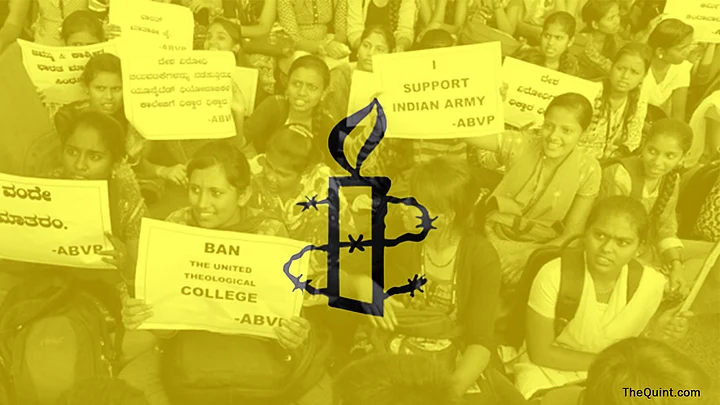An FIR has been issued against the human rights organisation Amnesty International’s India office. The charges are that of sedition.
It all started with Amnesty organising an event in connection to their report on human rights abuse in Kashmir. As the event proceeded, a few participants allegedly shouted “anti-national” and “anti-Indian Army” slogans.
Akhil Bharatiya Vidyarthi Parishad (ABVP) a students body affiliated to Bhartiya Janta Party (BJP) has organised multiple rounds of protests since then. They are demanding the immediate arrest of Amnesty staff and panelists, without investigations or a legal proceeding.
Crackdown on Foreign NGOs
While the police conducts investigations and the nation debates anti-nationalism, many believe, Amnesty International will soon be a part of the list of ‘foreign funded’ NGOs facing a crackdown unleashed by the Modi government since it came to power.
Also Read:
Amnesty Hits ABVP With Detailed Rebuttal of Sedition Charge
The crackdown on the ‘foreign’ NGOs and the attempts to regularise their funding is something that was started by the congress government and has been continued by the BJP since it came to power.
It was the Manmohan Singh government that speculated a “foreign hand” behind the protests and demands to scrap the Kudankulam Nuclear Power Plant project. The Foreign Contribution Regulation Act (FCRA) was then tightened by P Chidambaram, the then home minister.
As the current controversy intensifies, the Home Ministry has already hinted that it is unlikely to allow Amnesty international’s India wing to be registered under FCRA, thereby denying it access to foreign funds. Their request to establish another office in Delhi is also likely to be turned down.
NGOs have been a target of government action since about 2010, including Amnesty in particular. India’s tax laws, foreign money laws, visa rules and penal codes provide many options for governments. No NGO or person can often comply with these laws without violating at least 10 percent of them. Punitive action is often selective.Pavan Srinath, Takshashila Institution, Bengaluru
Karnataka Elections 2018
The political dynamics of Karnataka have an equal role to play in the Amnesty row. In a state gearing up for elections in 2018, a lot is at stake for the front running parties, the BJP and the Congress.
By 2010, when operation Kamal brought about the demise of the BJP government in Karnataka, the government’s tenure had already become “a heady cocktail of casteism, communalism and corruption”.
The most widely remembered example is the 2009 Mangalore pub attack, when a group of women drinking at a bar were attacked by Sri Ram Sene, led by a former RSS member Pramod Muthalik.
The incident drew extreme backlash towards the ruling BJP and the party decided to distance itself from the ‘cultural outfit’ and its leader Muthalilk.
Losing power to Siddaramaiah-led Congress in 2013, the BJP took a backseat for sometime. But as the Congress government began floundering, the BJP has kept its rhetoric alive riding on one issue to the another.
After the Congress government’s decision to celebrate Tipu Sultan’s birth anniversary in 2015, BJP and VHP embarked on a political journey. The statewide protests that crippled Karnataka for three days resulted in BJP and VHP leaders frequenting the frontpages of national, local and regional media.
Also Read:
Modi@2: What’s on the PM’s Mind While His Government’s Under Fire?
The Tipu Sultan controversy, prominent writer and rationalist MM Kalburgi’s murder by alleged right-wing groups, the beef ban controversy that saw a local BJP leader threatening to “behead the Chief Minister if he dared to eat beef”, have kept the Karnataka BJP in limelight.
This is not to undermine BS Yedyurappa’s tour of the drought-affected areas, immediately after his selection as the party chief, allegedly in a one crore SUV.
The filing of an FIR is a procedural activity, that may not be politically motivated. What is important now is how the Congress government handles the issue. Siddharamiah definitely does not want the BJP to score brownie points on a sensitive issue. The Congress leaders have suggested the CM to be careful with the arrests, but we must not forget that he is known for not toeing the party line at times. We need to wait and watch.Dr Sandeep Shastri, Political Scientist
The Enemies of the State?
The courts have repeatedly ruled against sedition charges. Historically, sedition cases have mostly been scrapped with the courts reiterating that sedition is to be understood as an “activity” more than a “thought”. However, no party is interested in repealing the sedition laws because they are useful instruments to go after people they do not like.
Also Read:
1934 to 2016: How Courts in India Looked at Charges of Sedition
The politics on sedition and nationalism may not die down soon. What we are witnessing is a war of allegations and slogans with each side being equally violent, unjust, unreasonable and illogical.
Indian politics is competitively intolerant. If one person is intolerant and has made news, the other wants to be seen as equally intolerant and dominate news. A few years ago, the debate was around parties being secular vs pseudo-secular. Now the whole narrative has changed. It is about national vs. anti-national. And no party or individual wants to be seen as anti-national. The word is being flung around very loosely.Pavan Srinath, Takshashila Institution, Bengaluru
(At The Quint, we question everything. Play an active role in shaping our journalism by becoming a member today.)
